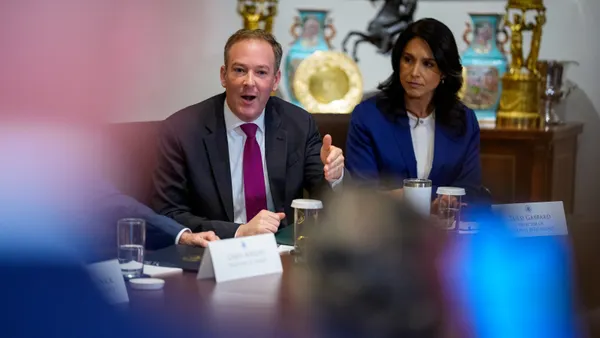Dive Brief:
- President Donald Trump issued an executive order targeting state policies to “address ‘climate change’ or involving ‘environmental, social and governance’ initiatives” and directing U.S. Attorney General Pam Bondi to “take all appropriate action” to stop their enforcement.
- The April 8 order also directs Bondi to take action to stop states’ civil actions against oil producers that seek damages for climate change and also takes aim at carbon “cap and trade” laws or other carbon taxes. It is unclear what actions Bondi would take to impede state policies and litigation.
- The annual number of climate lawsuits against the largest fossil fuel producers have nearly tripled since 2015, and some Democratic-led states and localities have followed suit in court with mixed results so far. Others including New York and Vermont have implemented or introduced laws to send fossil fuel companies the bill for climate-related damages.
Dive Insight:
Major oil producers have faced a mixed bag defending against state climate litigation.
Oil companies have had lawsuits initiated by the states of New Jersey and New York dismissed this year. However, industry bids to dismiss lawsuits filed by the states of California and Connecticut and the county and city of Honolulu, Hawaii have been unsuccessful thus far. The Supreme Court also declined to take up a case from 19 Republican-led states that looked to have the Court dismiss state climate lawsuits.
Trump’s order, titled “Protecting American energy from state overreach,” says that states have enacted or are enacting “burdensome and ideologically motivated ‘climate change’ or energy policies that threaten American energy dominance and our economic and national security.” The order lists New York and Vermont’s climate liability laws, as well as California’s carbon “cap and trade” policy and state climate suits as impediments to U.S. energy producers.
Trump said such state laws are “illegitimate impediments” to domestic energy expansion, specifically for “oil, natural gas, coal, hydropower, geothermal, biofuel, critical mineral and nuclear energy resources.”
“These state laws and policies weaken our national security and devastate Americans by driving up energy costs for families coast-to-coast, despite some of these families not living or voting in States with these crippling policies,” the order said. “These laws and policies also undermine federalism by projecting the regulatory preferences of a few states into all states.”
Trump’s order directs Bondi to target any state policies that delay permit reviews for the identified energy sources. The order says state-level climate, emissions and ESG laws and policies “are fundamentally irreconcilable with my Administration’s objective to unleash American energy” and “should not stand.”
The order also directs Bondi to identify any state laws regarding environmental justice, carbon or greenhouse gas emissions. She will have 60 days to issue a report on any actions taken and any recommendations for further executive or legislative actions required to stop their enforcement.
The Biden administration’s solicitor general previously gave a U.S. government position dissuading the Supreme Court from intervening in Honolulu’s climate lawsuit and from taking up the Republican-led lawsuit against state climate suits. Bondi could potentially direct the Department of Justice to support major oil producers in ongoing litigation.
The order’s mention of laws related to greenhouse gas emissions could put state net-zero targets in the crosshairs, as 14 states currently have net-zero and interim emissions reduction targets, according to the Council of State Governments Eastern Regional Conference. Additionally, California’s climate-risk disclosure laws for companies operating in the state could also be implicated by the order. New York recently reintroduced its own version of the climate-risk disclosure laws in its state legislature.
As far as state-level ESG laws, the majority of states with laws on the subject have promulgated anti-ESG laws. At least 41 states have proposed or enacted ESG-related laws since 2021, with 20 of the states enacting laws comprising the anti-ESG variety, according to law firm Morgan Lewis.
On the other hand, just eight states have enacted “pro-ESG” laws, that suggest or require ESG factors to be considered “or that disincentivize investment in a particular controversial industry or sector” like fossil fuels, according to Morgan Lewis.
The order follows the Trump administration’s broader reversal on federal climate policies, which has included a second exit from the Paris Climate Agreement and other international climate obligations and broad federal funding pauses for climate programs. Additionally, the Securities and Exchange Commission recently withdrew its defense of the agency’s climate-risk disclosure rule, and federal financial regulators have also departed from international climate groups.











